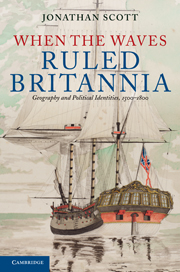Book contents
- Frontmatter
- Contents
- List of figures
- List of maps
- Preface: Geography and the sea
- List of abbreviations
- Introduction: Britain's island idea
- 1 Community of water
- 2 Queen of Sparta
- 3 The discipline of the sea
- 4 Ark of war
- 5 Blowing a dead coal
- 6 The British empire in Europe
- 7 The world in an island
- 8 Anti-continentalism
- 9 What continent?
- Conclusion: floating islands
- Appendix: Duck Language (1724)
- Bibliography
- Index
Preface: Geography and the sea
Published online by Cambridge University Press: 05 June 2012
- Frontmatter
- Contents
- List of figures
- List of maps
- Preface: Geography and the sea
- List of abbreviations
- Introduction: Britain's island idea
- 1 Community of water
- 2 Queen of Sparta
- 3 The discipline of the sea
- 4 Ark of war
- 5 Blowing a dead coal
- 6 The British empire in Europe
- 7 The world in an island
- 8 Anti-continentalism
- 9 What continent?
- Conclusion: floating islands
- Appendix: Duck Language (1724)
- Bibliography
- Index
Summary
This study began as a trickle and swept me out to sea. It remains a limited vessel navigating more than one large body of knowledge, but I hope it is seaworthy. I began by reading voyage narratives, most, though not all, maritime. These included the journals of Cook and the frequently hair-raising accounts by early British settlers of their voyages to New Zealand. The travellers were always seasick, there were always storms, and amid the sharks, seabirds, red shrimps off Argentina, and many other creatures and events, life went on: birth, eating, drinking and death. Most travellers arrived. ‘[W]e could see the smoke rising from several fires on shore. The coast was by what I could see rocky and steep … we hauled a fine white fish weighing about 40 pounds like our cod and called by the natives harbouker [hapuka, grouper] … Fine night dead calm the harbour like a mirror reflecting all the lights from the little shops that ran along the beach.’
This starting point owed something to the work of J. C. Beaglehole, and not only to his famous editorial labours (those footnotes still hold good, and he was an extremely sound judge of south-east Asian tropical fruit). Beaglehole also wrote about seventeenth-century England, gave a brilliant inaugural lecture called ‘The New Zealand Scholar’, and produced his lip-smacking first book, The Exploration of the Pacific, while a semi-unemployed doctoral graduate trained in an entirely different historical area.
- Type
- Chapter
- Information
- When the Waves Ruled BritanniaGeography and Political Identities, 1500–1800, pp. xi - xviPublisher: Cambridge University PressPrint publication year: 2011



